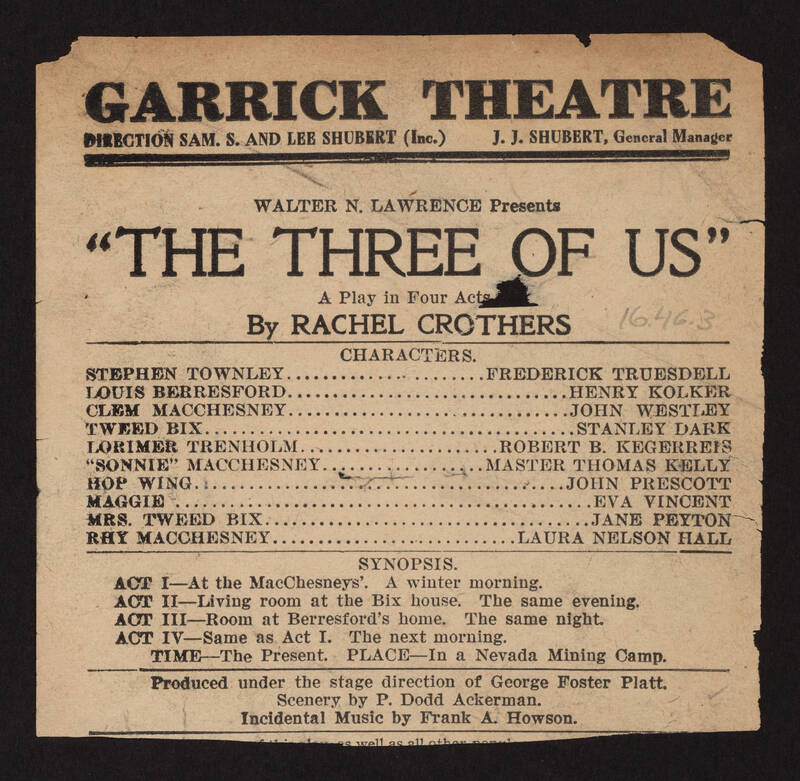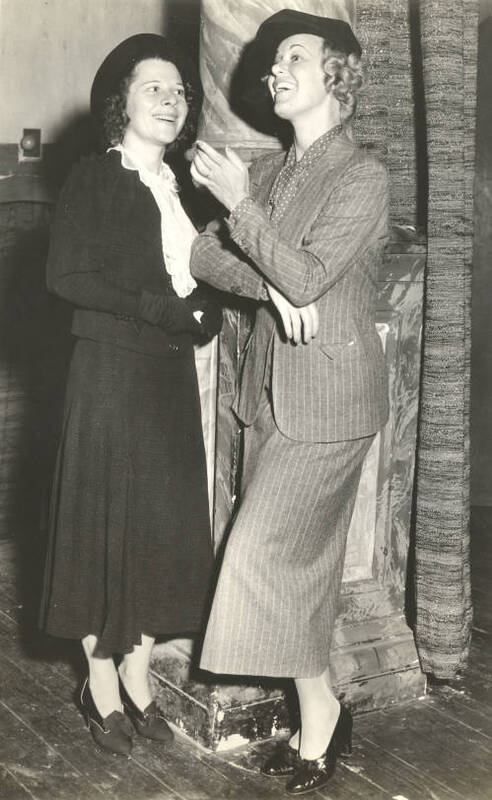Rachel Crothers: Plays
Crothers wrote throughout her life and had approximately 30 major plays. These were produced from the early 1900’s to the mid-1930's. Of her major works, 12 were adapted into films, including When Ladies Meet (1933), starring Myrna Loy, and Susan and God (1940), starring Joan Crawford. Her other works include a handful of screenplays, interviews, and speeches.
The Three of Us (1906)
Crothers’s first breakout play was representative of the work that would follow. It featured a female main character who was not perfectly feminine in a traditional sense and the drama surrounded her life as well as her interactions with the men around her. The Three of Us follows Rhy and her two brothers. It has been ten years since their father’s death, which left them orphaned and in charge of the defunct family silver mine. In her brief description, Rhy, the head of the household, is boyish, confident, and yet still attractive in a feminine way. As the events of the play unfold, Rhy encounters both a villainous man as well as a seemingly honorable one, and is pitted between them. In writing about this play in her biography of Crothers, Lois Gottlieb notes that, “what lifts the action above the level of melodramatic cliché is that the conflict over woman’s honor between Rhy and the villain is repeated in the conflict between Rhy and her upright suitor. Both men are guilty of demeaning woman through imposition of the dual moral standard, and although Crothers delivers no direct criticism of the social bases of the code, she does show its cruelty, whether imposed by good men or bad” (9). After this success, Crothers was able to express her ideas more freely, and her confidence as a playwright grew.
A Man’s World (1909)
Although not as well received as The Three of Us, A Man’s World ran for 71 performances, sparked conversation after its release, and is remembered for its strong statements on the moral lives of men and women. In this play, Crothers’s main character is Frank Ware, a woman novelist. At the beginning of the play, critics discover that she is not actually a man, which they had assumed from her name. Along with writing, Frank is also raising an adopted child, Kiddie, who was born to an unwed woman who passed away shortly after delivering her child. Frank is deeply bothered by this incident, as it highlights the contrasting experience of an unwed woman and an unwed man engaging in an affair. It was not Crothers’s intention to preach with her plays, and her main goal was always to entertain. However, her play did argue for a more equal treatment of men and women in this respect. In the play, Frank states that “Man sets the standard for woman. He knows she’s better than he is and he demands that she be—and if she isn’t, she’s got to suffer for it” (10). While The Three of Us ended with Rhy continuing to have a male figure in her life (that of her brother, Clem), A Man’s World had a less palatable ending for many audiences—despite being involved with a man throughout the play (who, it turned out, is the father of her adopted son), Frank chooses to go her own way at the end, rather than settle down.
Let Us Be Gay (1929)
In this later play, Crothers continues investigating themes similar to those in her other works, including marriage, fidelity, and double standards between men and women. It focuses on the life of Kitty Brown, who divorced her husband, Bob, after discovering that he had an affair. They reconnect, years later, and discover that neither has been particularly happy since they parted ways. However, Bob is shocked to learn that Kitty has had affairs in their years apart. Crothers examines the double standard present in society with regard to sexual freedom through their reunion at a party put on by wealthy acquaintances. Also present in this play are a variety of women of different ages, who show the contrast between social standards for women in different generations. While the ending of the play, which has Kitty and Bob reuniting and affirming the importance of fidelity, reflects the more conservative social values of the time period, Crothers does still take a comedic yet still serious look at relationships.
In 1930, Let Us Be Gay was adapted by MGM into a film of the same title in 1930 which starred Norma Shearer, Rod La Rocque, and Hedda Hopper.
(9) Lois C. Gottlieb, Rachel Crothers (Boston: Twayne Publishers, 1979), 25, http://archive.org/details/rachelcrothers0332gott.
(10) Rachel Crothers, A Man’s World; a Play in Four Acts (Boston: R.G. Badger, 1915), 40, http://archive.org/details/mansworldplayinf00crotuoft.



